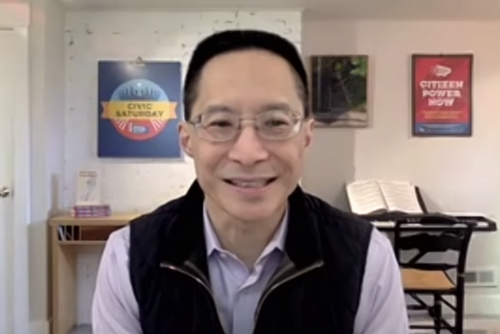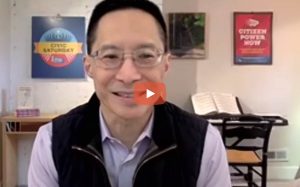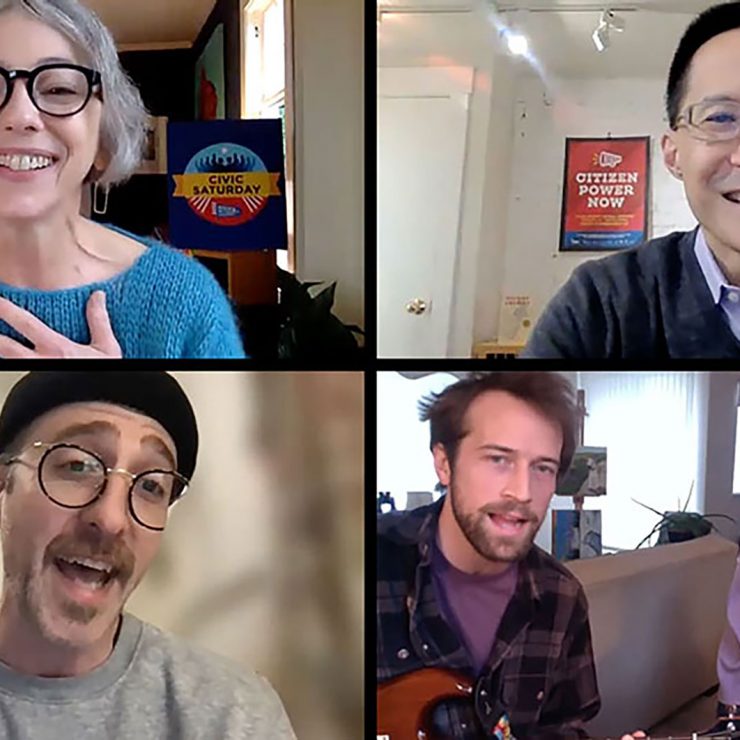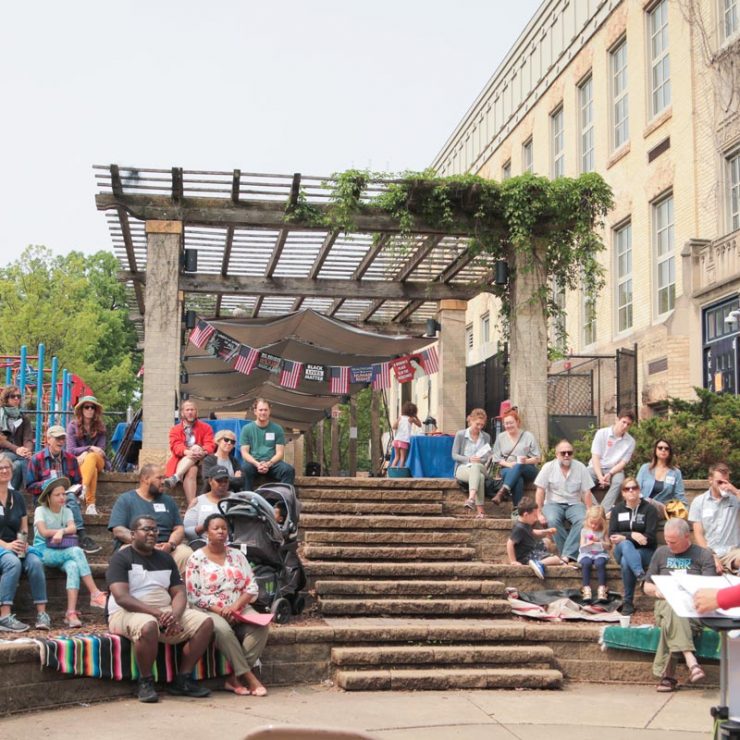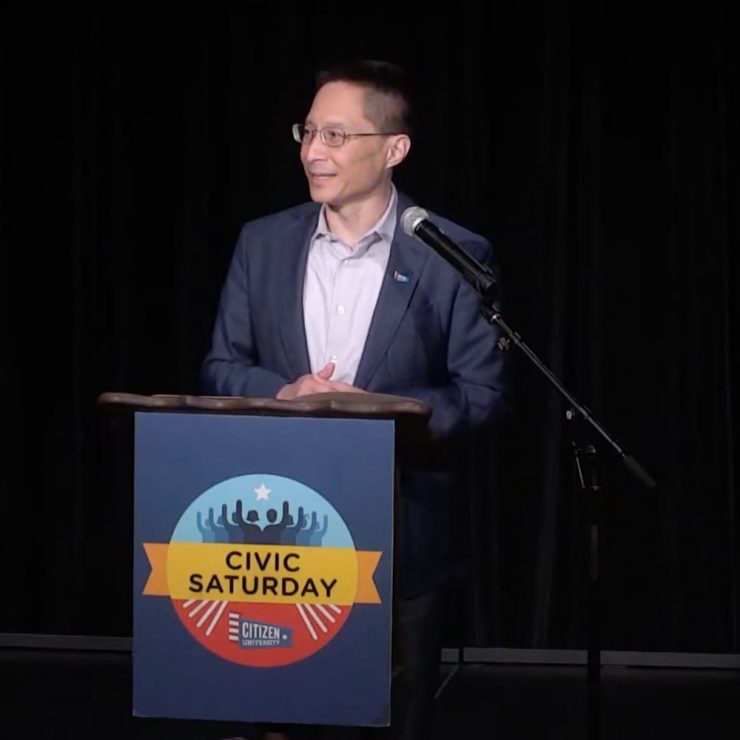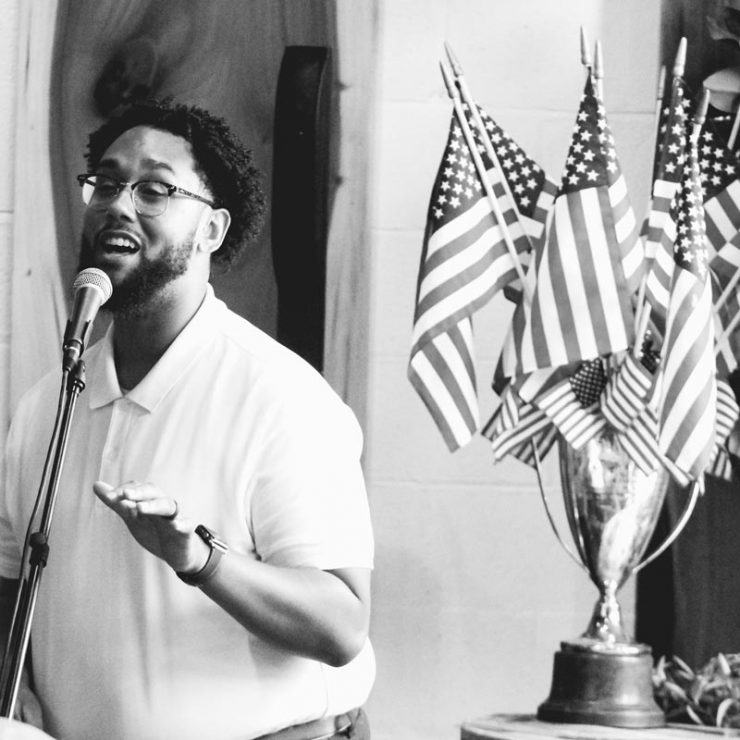I want to share some thoughts today about what it means for us to bring about a season of renewal, and specifically about three things – senses or sensibilities – that we can now decide to renew: perspective, curiosity, and commitment.
Let’s start with perspective. This is a time for us, two weeks now into Vladimir Putin’s invasion of Ukraine, to renew our sense of perspective.
As Americans, we are so divided, so polarized, so consumed by manufactured controversies, not only of the hour or the day, of the Twitter minute, that pass like a thought or a spasm. And what Vladimir Putin has done for us is he has clarified the stakes. He’s reminded us of what is at stake in the United States and around the world right now.
I think we Americans, over the last many years, have developed a habit of speaking a little too casually of tyranny, a little too thoughtlessly and superficially of oppression.
When I think about that convoy of man-children in their big trucks, driving in the Freedom Convoy, demanding relief from the tyranny of – of what? public health measures in a pandemic? – I think about that convoy and I think about their profound self-indulgence.
When I think about people on the left who want to police every form of language in conversation, casual or in public, and scrub it of anything that might run afoul of an anti-oppression agenda, I think we in the United States are a little bit inured to the way we live in luxury. I don’t mean material luxury. I mean when you compare it to the peoples of the world, when you compare it to the circumstances of Ukraine, we live in luxury.
Nothing puts a microaggression in proper perspective like a world-historical macro-aggression of the kind Vladimir Putin has undertaken.
Nothing puts cries of “tyranny!” and “don’t tread on me!” into proper perspective like the treads of the tanks of the Russian army rolling into and surrounding and laying siege to city after city, killing civilians, not as a byproduct, not as collateral damage, but as the point.
And so perspective is one thing we’ve been given in this time.
Now, of course, we in the United States do have injustice – deep, persistent, gut-wrenching, heart-rending injustice. And we have people here in the United States who increasingly vocally express the ways in which they don’t particularly like democracy – people who, in the legislatures of states like Florida and Texas, are afraid of quote-unquote divisive concepts like talking about our history of racial injustice and the present persistence of racial injustice, and who are so afraid of these divisive concepts that they want to ban schoolteachers from talking about them, from creating zones of “discomfort” for anybody.
But we know who the “anybody” is whom they wish to keep unafflicted from discomfort.
So we have people who are unwilling to embrace the full measure of freedom, uncomfortable as it may be.
But because we in the United States are bound together by a creed, by a set of ideas of equality and liberty and justice for all, we also have the combination blessing/burden of hypocrisy.
You might think hypocrisy is a funny thing to say is a blessing, but we are blessed with hypocrisy. We are blessed with a sense of hypocrisy. It is a blessing to realize, when you see people trying to stifle free speech and the name of comfort, when you see people trying to ban certain ideas, when you see legislatures telling people “don’t say gay,” to realize that that’s not just offensive to some sense of kindness and empathy, but it is an act of hypocrisy.
Why? Because it’s baked into our original promises that we should have liberty and equality under the law and equal justice under law. And that creed sits there, sometimes spurring us, sometimes mocking us. But it is there, and in Russia there is no such creed. In China there is no such creed. Vladimir Putin can be completely, nakedly open about his intentions to extend an empire, and to reclaim what he thinks is rightfully part of the Russian civilization, to stamp out an experiment in self-government and a sense of national identity in the place called Ukraine. That experiment is offensive to his raw drive for overwhelming domination and power. There’s no creed he has to live up to. There are no promises he’s breaking there. He’s operating in a long line of rulers of Russia, for whom might has made right.
I recently was reading a book by the Chinese dissident artist Ai Wei Wei called 1,000 Years of Joys and Sorrows. If you don’t know Ai Wei Wei and if you don’t know this book, I plead to you to learn about him, and to get this book. He no longer lives in China. He’s based in Berlin now, but he came to fame initially as an artist of great iconoclasm, a Duchamp-Warhol style of opposing the ancient norms of the Chinese civilization – norms that were about collectivism and conformity – and turning an individual into just a little rice grain or a little sunflower seed lost in a sea of such. His art was hugely contrary to that pattern, and over time the Chinese government found his art threatening, and he was intimidated and he was harassed.
Ultimately he was detained for three months and disappeared for a while, and his memoir talks about authoritarianism, and the ways in which the greatest threats of authoritarianism come not when a police state abducts you and puts a hood over your head and detains you in a room where two guards are there with you 24/7 telling you hour by hour, minute by minute, what you can and cannot do. The truest threat of authoritarianism is in the ways that that fact leads everyone else in your community and your circle to censor themselves.
When you read this memoir and study Ai Wei Wei’s work, you become made aware again with a sense of perspective, of the ways in which we in the United States take too much for granted and that we in the United States are experiencing a cross-ideological temptation to stifle free thought and free speech in the name of avoiding discomfort. You don’t need an authoritarian, jack-booted police officer to come in and make you stop saying incorrect thoughts. We’re doing that to each other community by community, classroom by classroom.
And so perspective in this season requires us to remember what we have and what we inherited.
Broken, unfulfilled as it may be, we must not squander what we’ve been given.
We in the United States can still debate whether 1619 and the beginning of slavery is the proper place to root our origin stories or whether 1776 is, and i’ll tell you what – in China they can’t debate 1989. They can’t name Tiananmen Square. They can’t talk about that, and it has been erased from memory and from discourse.
And so perspective requires us not to squander what it is that we’re capable of.
But it is not only the gift of being able to argue, it is the responsibility, then, to bring to that argument a sense of moral discernment. That text we heard from Frederick Douglass resonates today because you realize the long history of voter suppression, long history of intimidation, peaceful and violent, under color of law and under threat of a club or a noose, that has kept voters of color from expressing their full voice and power throughout our history.
And you see the throughline from that to the ways, in state after state in the United States today, there are still efforts to keep the poor, the young, the brown, the black, from expressing their voice and their power at the ballot box. And yet moral discernment and perspective require us to recognize this is not then.
Yes, it has taken us over 150 years to actually pass, as the Congress just did this week, an anti-lynching law. But what does that tell you? Does that tell you that this country’s pitifully slow in facing injustice? Or does that tell you that this country is capable of claiming justice?
Consider the text we heard from President Reagan. Perhaps you thought it was too upbeat, too Reaganesque and warm fuzzy “Morning in America” about freedom here in our classrooms and courtrooms. Maybe some of you who are of the left, and have a reflexive disdain for anything with the word Reagan in it, feel that way. But let me tell you every word he said in that excerpt we heard is true. There is a deep truth underlying what he said.
It’s not true that every courtroom is fair. It’s not true that every classroom is inclusive. But what is true and what is timelessly true is what freedom gives us the chance to do. And perspective requires us to steward the gift of freedom – to put our disagreements, to put our disappointments in America, to productive use.
That brings me to the second thing that I wanted to speak about, which is a sense of curiosity. That seems so self-evident and yet in our time right now, that particular civic virtue is probably least on display, and least in our practice and in our heartset and mindset.
In 1989, when I was a junior in college, I went to the Soviet Union on an exchange program between Yale and Moscow State University. It was a year after Reagan had spoken there, a season of opening and glasnost and perestroika. We were a group of a dozen or 15 Americans, every background, every kind of American you could imagine.
And we arrived in the Soviet Union, meeting our counterparts, these students at Moscow State. We were not equals in material terms. We, the Americans, had relative wealth. We as Americans had relative privilege. We had had a lifetime of practicing habits of free expression, free thought, freedom itself, and we had the diversity and the experience with diversity that showed us what was possible when diversity became unity. But in these conversations with Soviet students there was parity. We were equals with them in conversation, equally eager to learn about each other.
I was reminded of this this week, when I was in conversation with my friend Mónica Guzmán, who works for Braver Angels, a wonderful organization bringing people from the left and right together, and she has a brand new book out this week, called I Never Thought of it That Way. It’s a book about how to actually build the muscle of curiosity as a way to depolarize and rehumanize civic life.
One of the things she says is that it’s super-important to create containers, spaces, contrived as they may be – as contrived as, say, a Civic Saturday – where for at least a fleeting moment there is parity in conversation. Where we can enter in and meet new people, as you just did in your Turn and Talks, with equal respect, equal care, equal dignity, and equal expectations of respect, care, and dignity.
We’ve got to find ways to create that kind of parity in conversation, because there’s another term for parity in conversation: equal citizenship.
We entered into those Turn and Talks unequal in material circumstance, in age and experience, in power, in capital. But for those six minutes we found parity and curiosity. This time requires us to take some pages from the playbook that Mónica Guzmán has laid out in her book to practice.
For instance: ask questions that begin with how rather than why. Because if you say, “Why do you think that?” you’re basically saying, “Why are you such an idiot?” But if you ask, “How did you come to see the world this way?” with a spirit of genuine openness and curiosity, you’re inviting someone into sharing who they are without defense.
She speaks also of the role of bridges in the work of bridge-building, and the complaint that you hear from many people, particularly on the left: “Why should I engage someone whose views are so odious? Why should I engage someone whose views might not even respect my own humanity as a person of color, an immigrant, a Muslim, a transgender person? Why should I have to do that work?” And her answer is you don’t have to do that work alone. We’re all doing that work together. But secondly, her point is you don’t necessarily even have to cross that bridge. Just keep the bridge. Don’t bomb the bridge. Don’t cut yourself off forever.
There are so many wonderful practices that she shares that we’ve all got to learn to cultivate. One of the things that struck me as I was talking to Mónica – we were at an event with a wonderful organization in Chicagoland called Family Action Network – and what struck me in that conversation was that civic curiosity is so necessary right now at a time when we have such righteous certitude. We need to pop back into three dimensions the two-dimensional cartoons we’ve drawn of one another. And yet, while necessary, this kind of civic curiosity is still insufficient. Because outside those containers, however we may draw them and hold them, once you step outside there still is inequality and the ruthless use of unequal power.
After our wonderful two weeks in Moscow, we Americans left to return to a free society. They stayed in Moscow, and they stayed in a society that then was in transition, full of hope, but also, as we saw in just a few short years, unable to stop the return, the creeping, seeping hunger for autocracy and the need for someone to dominate and tell them what to do.
Five years after I was there as a student, I returned to Moscow State University, and to Moscow as a speechwriter for President Clinton. He went there in January of 1994, and he gave a speech that I helped to write in which he spoke to young people in Russia. By the way, the speech was at Ostankino television tower. You may be hearing that word right now, Ostankino, because that is literally the physical structure that beams out all of the propaganda and all of the profoundly fake news that the Russian government is indoctrinating the Russian people with right now about what’s happening in Ukraine.
When Clinton went there in 1994, it was just three months after there had been a violent uprising in Russia after President Yeltsin, who the West thought of as the champion for democracy, had disbanded Parliament. Parliament fought back, and there was violence, and people died in Ostankino Tower. Just three months after that, President Clinton spoke to these young people, and conscious of all that disruption, the counsel he gave me as a speechwriter was, we must appeal to their sense of pride. They have a wounded sense of pride in Russia. Right now we must appeal to their sense of greatness but then remind them that Russia can be great in ways that are not about autocracy and about central rule. They can be great in ways that speak to all the deepest gifts of Russian civilization.
Of course, looking back on it now, and maybe even looking back on it a couple years after that fact, that was profoundly naive.
Power was allocated the way power was because of the depth of patterns of autocracy and authoritarianism.
Those currents were too strong, and they were like riptides pulling people in and under, and people, curious as they may have been about democracy, made other choices.
I wonder. Where are those young Russians I met? Where is Yulia from Lviv, who spoke with pride of her family there. Where did she go? Where is Dima, who was our host, whose English was so good, we always thought he was our KGB handler. What became of him? What did they choose? Our curiosity has to be moral curiosity, too.
What do we choose? How do we choose? When do we choose?
That brings me to the third and final sense that we’ve got to renew in this season, and that is a spirit of commitment. What can we do about Ukraine right now? I hear that everyday: “What do I do? I feel so helpless right now. Besides watching the news and putting out flags with blue and yellow, what do I do?”
My answer is to simply commit.
Commit to fortifying democracy here. The stakes are what we now see them to be and what’s being invaded is not just the territory of a sovereign nation called Ukraine; what is being invaded is the idea of democracy itself. What is being invaded is the idea that “government of the people, by the people, for the people” should not ever perish from the earth.
Commit to making freedom more robust, and remember that freedom is not removal of encumbrance. Freedom is responsibility. Freedom is not just the right to do what you wish.
Freedom is responsibility. And so let us take responsibility.
Let us commit, in the first place, to learn our history, and to argue our history. All of it – the good, the bad, and the ugly – but all of it in proportion. Understand that when Douglas closed that excerpt we heard in civic scripture today, he was quoting Lincoln at Gettysburg. Understand that when Reagan spoke, he was speaking from a long line of champions and advocates of freedom that includes Douglass, includes the women of Seneca Falls, that includes people of every color and faith. Learn and argue that history.
Let’s commit to join. The simplest one-word answer I have for “What do I do?” is join. Join.
You’ve joined here today. But join other groups and associations that will keep on meeting, groups like this, gatherings like this. Get out of isolation right now. Get off your Twitter feed and join. Join with a spirit not of only finding birds of a feather; join with a spirit of pluralism.
Yancy Villa, who’s a wonderful citizen artist who’s been part of our Civic Saturday Fellowship program, by chance was in my Turn and Talk just a few minutes ago. She told me about a thing that she does to renew herself. She looks around and identifies people she thinks would be interesting to connect with for her work as an artist. It might be a list in Memphis of 100 interesting movers and shakers. It might be something else. And she will just contact these people by email and say, “Here’s who I am, I’m a citizen artist doing really interesting public art and other forms of civic work. I find you interesting. Want to talk? if you do, here’s my calendar app find this date and time.” I love that! I love that spirit of joining, of inviting.
Let’s also commit to building institutions. My friend, someone I admire greatly, Anne Stadler, is in the room here today. A week ago we had a fundraiser gathering for the organization that she and so many others in North Seattle, in Lake Forest Park, created called Third Place Commons. It grows out of a little bookstore that was called Third Place Books, and they created a commons, an actual space where people continuously gather for talks, for music, for concerts, for knitting clubs, for you name it, every kind of civic activity, and they’ve held this space for 22 years. They have built an institution. Is that institution as famous as the United States Congress or the Washington Post? No. But is it as necessary to the life of our democracy? You bet it is. Third Place Commons.
Let us commit finally to this work of building a thing that has never been built in human history. Let us remember: when you have the perspective of looking at China, when you have the perspective of people fleeing Ukraine, the people persecuting and killing them, let us remember that we in the United States, though we may be cynical, though we may be tired, though we may be frustrated, we are living through a case of first impression. We are trying to show for the first time in human history that it is possible to build, sustain, correct, and redeem a mass, multi-racial, democratic republic.
That has never been done in a way that’s sustained. It’s never been done in a way that actually included all. Commitment to this project requires a commitment to tolerance, a commitment to curiosity, a commitment to perspective, and a commitment to moral humility; and knowing that, as President Reagan said, no one has monopoly on truth or wisdom.
So let us in this season recommit to renewing perspective, curiosity, and commitment. That’s what freedom takes. That’s what It takes for us right now to defend democracy.
Tonight, overnight, we’re going to lose an hour and gain Daylight Savings Time. As we think about renewal – and it’s a gift even to use that word because of all we’ve lost these last two years, nearly a 1,000,000 Americans and many millions more around the world, to this pandemic – we have a chance, a glimmer even in the midst of pandemic and war, to gain a new season right now.
So let us commit to each other right now. Let’s make the call fifteen hours early. It’s time to spring ahead. Spring ahead now to a new birth of freedom.
Civic scripture to accompany the civic sermon
Frederick Douglass
From a Speech to the National Convention of Colored Men
Louisville, Kentucky
September 24, 1883
It was once said by the great O’Connell that the history of Ireland might be traced like a
wounded man through a crowd by the blood, and the same may truly be said of the
history of the colored voters of the South.
They have marched to the ballot-box in face of gleaming weapons, wounds, and death.
They have been abandoned by the Government and left to the laws of nature. So far as
they are concerned, there is no Government or Constitution of the United States….
This is no question of party. It is a question of law and government. It is a question
whether men shall be protected by law or left to the mercy of cyclones of anarchy and
bloodshed. It is whether the Government or the mob shall rule this land; whether the
promises solemnly made to us in the Constitution shall be manfully kept or meanly and
fragrantly broken….
We hold it to be self-evident that no class or color should be the exclusive rulers of this
country. If there is such a ruling class, there must of course be a subject class, and
when this condition is once established this Government of the people, by the people,
and for the people will have perished from the earth.
President Ronald Reagan
From a speech at Moscow State University
Moscow, Soviet Union
May 31, 1988
We Americans make no secret of our belief in freedom…. Go to any American town, to
take just an example, and you’ll see dozens of churches, representing many different
beliefs – in many places, synagogues and mosques – and you’ll see families of every
conceivable nationality worshiping together. Go into any schoolroom, and there you will
see children being taught the Declaration of Independence, that they are endowed by
their Creator with certain unalienable rights – among them life, liberty, and the pursuit of
happiness — that no government can justly deny; the guarantees in their Constitution for
freedom of speech, freedom of assembly, and freedom of religion. Go into any
courtroom, and there will preside an independent judge, beholden to no government
power. There every defendant has the right to a trial by a jury of his peers, usually 12
men and women – common citizens; they are the ones, the only ones, who weigh the evidence and decide on guilt or innocence…. Go to any university campus, and there
you’ll find an open, sometimes heated discussion of the problems in American society
and what can be done to correct them…. March in any demonstration, and there are
many of them; the people’s right of assembly is guaranteed in the Constitution and
protected by the police. Go into any union hall, where the members know their right to
strike is protected by law. As a matter of fact, one of the many jobs I had before this one
was being president of a union, the Screen Actors Guild. I led my union out on strike,
and I’m proud to say we won.
But freedom is more even than this. Freedom is the right to question and change the
established way of doing things. It is the continuing revolution of the marketplace. It is
the understanding that allows us to recognize shortcomings and seek solutions. It is the
right to put forth an idea, scoffed at by the experts, and watch it catch fire among the
people. It is the right to dream — to follow your dream or stick to your conscience, even
if you’re the only one in a sea of doubters. Freedom is the recognition that no single
person, no single authority or government has a monopoly on the truth, but that every
individual life is infinitely precious, that every one of us put on this world has been put
there for a reason and has something to offer.
